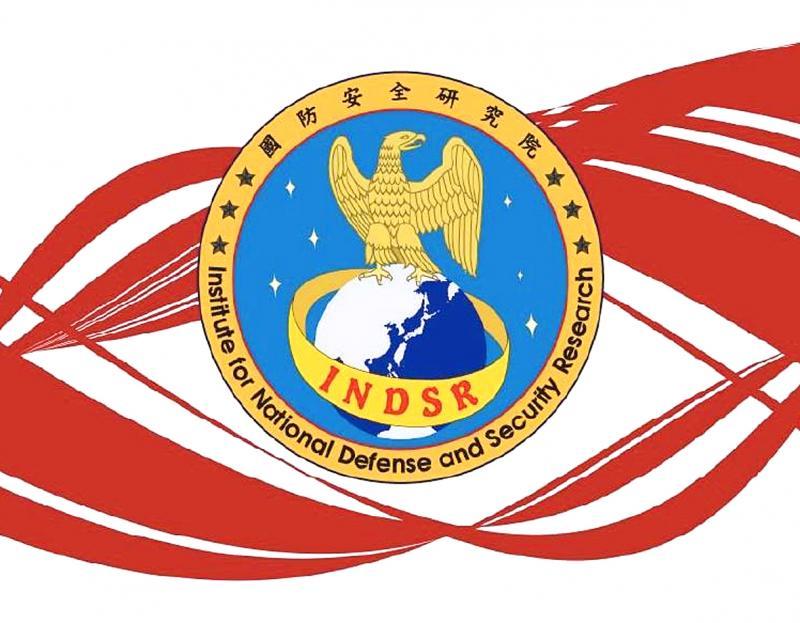The Institute for National Defense and Security Research is expanding its ties with think tanks in Europe, and they are interested in Taiwan’s experience in countering China’s security threats, a source familiar with the matter said yesterday.
Since its establishment in May 2018 by the Ministry of National Defense, the institute has interacted with think tanks or research agencies in the US, New Zealand, Australia, India, Japan, South Korea and Europe, its budget plans over the past few years showed.
Many European nations have been alerted to China’s “wolf warrior” diplomacy, military expansionism and its ties with Russia, which is an opportunity for the institute to acquire more partners through “think tank diplomacy,” an institute member said on condition of anonymity.

Photo: Aaron Tu, Taipei Times
The institute has twice led delegations to participate in the annual Berlin Security Conference, the member said.
The conference is “a window of opportunity” for the institute to expand its military interactions with European nations, it wrote in its budget plan for 2019, adding that it was attended by high-ranking military officers from Germany and Italy, but none from China.
However, as formal military interactions between Taiwan and Europe are impossible at this time, the institute’s priorities are to build up communication channels and mutual trust with its European counterparts, the member said.
Several European nations have expressed an interest in learning from Taiwan’s experience in countering disinformation campaigns and cognitive warfare by Beijing, the member added.
The institute had planned to visit the Finland-based European Centre of Excellence for Countering Hybrid Threats — established in 2017 by members from the US, the UK and Germany among others — as well as other research agencies in Estonia, Sweden and Denmark, its budget plan for last fiscal year showed.
While those plans were shelved due to the COVID-19 pandemic, there are many potential partners for the institute in the Baltic and northern Europe, as their situation is similar to that of Taiwan, having to confront threats posed by Russia, the member said.
When it comes to countering Beijing’s verbal and military intimidation, Taiwan is the most experienced nation, Democratic Progressive Party (DPP) Legislator Chao Tien-lin (趙天麟) said, adding that the institute could share Taiwan’s experience with its European partners.
The institute is Taiwan’s only official think tank, so it should continue to reach out to partners in the UK, France, Germany and Spain at a time when the EU and NATO are expanding their participation in the Indo-Pacific region, DPP Legislator Wang Ting-yu (王定宇) said.
Interactions with think tanks in Japan, Australia and India should continue, as these nations are also playing increasingly significant roles in the region, he said.
European nations had been less involved in the Indo-Pacific region, but that has changed, National Taiwan University Department of Political Science associate professor Chen Shih-min (陳世民) said.
“With China promoting ‘wolf warrior’ diplomacy and becoming more aggressive toward Taiwan and in the Indo-Pacific region, cross-strait issues have become a flash point of international security affairs,” Chen said. “European nations that maintain close ties with Washington cannot be indifferent to the situation.”

Taiwan is gearing up to celebrate the New Year at events across the country, headlined by the annual countdown and Taipei 101 fireworks display at midnight. Many of the events are to be livesteamed online. See below for lineups and links: Taipei Taipei’s New Year’s Party 2026 is to begin at 7pm and run until 1am, with the theme “Sailing to the Future.” South Korean girl group KARA is headlining the concert at Taipei City Hall Plaza, with additional performances by Amber An (安心亞), Nick Chou (周湯豪), hip-hop trio Nine One One (玖壹壹), Bii (畢書盡), girl group Genblue (幻藍小熊) and more. The festivities are to

Auckland rang in 2026 with a downtown fireworks display launched from New Zealand’s tallest structure, Sky Tower, making it the first major city to greet the new year at a celebration dampened by rain, while crowds in Taipei braved the elements to watch Taipei 101’s display. South Pacific countries are the first to bid farewell to 2025. Clocks struck midnight in Auckland, with a population of 1.7 million, 18 hours before the famous ball was to drop in New York’s Times Square. The five-minute display involved 3,500 fireworks launched from the 240m Sky Tower. Smaller community events were canceled across New Zealand’s

‘IRRESPONSIBLE’: Beijing’s constant disruption of the ‘status quo’ in the Taiwan Strait has damaged peace, stability and security in the Indo-Pacific region, MOFA said The Presidential Office yesterday condemned China’s launch of another military drill around Taiwan, saying such actions are a “unilateral provocation” that destabilizes regional peace and stability. China should immediately stop the irresponsible and provocative actions, Presidential Office spokeswoman Karen Kuo (郭雅慧) said, after the Chinese People’s Liberation Army (PLA) yesterday announced the start of a new round of joint exercises around Taiwan by the army, navy and air force, which it said were approaching “from different directions.” Code-named “Justice Mission 2025,” the exercises would be conducted in the Taiwan Strait and in areas north, southwest, southeast and east of Taiwan

UNDER WAY: The contract for advanced sensor systems would be fulfilled in Florida, and is expected to be completed by June 2031, the Pentagon said Lockheed Martin has been given a contract involving foreign military sales to Taiwan to meet what Washington calls “an urgent operational need” of Taiwan’s air force, the Pentagon said on Wednesday. The contract has a ceiling value of US$328.5 million, with US$157.3 million in foreign military sales funds obligated at the time of award, the Pentagon said in a statement. “This contract provides for the procurement and delivery of 55 Infrared Search and Track Legion Enhanced Sensor Pods, processors, pod containers and processor containers required to meet the urgent operational need of the Taiwan air force,” it said. The contract’s work would be